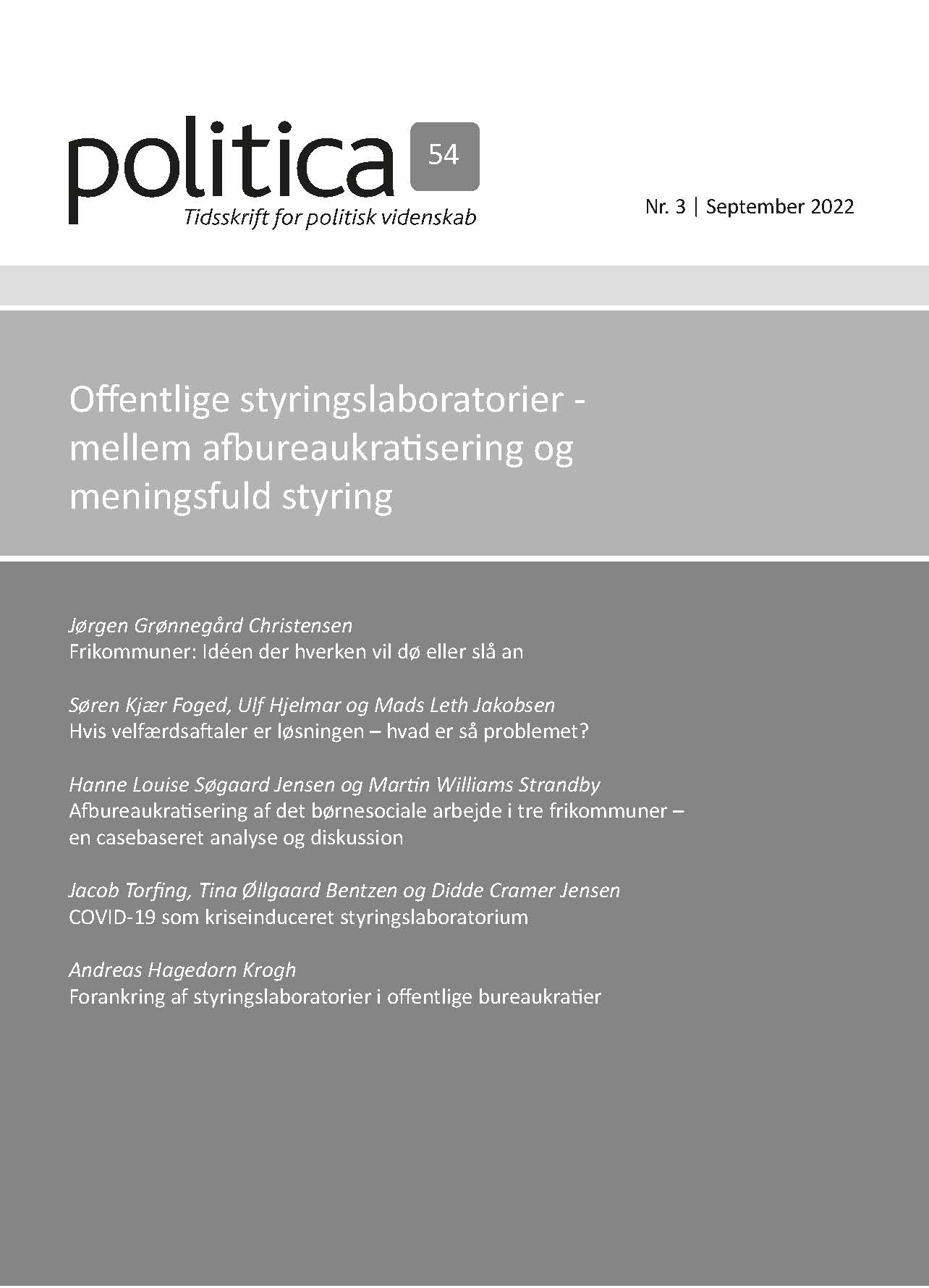Embedding of public sector innovation labs
DOI:
https://doi.org/10.7146/politica.v54i3.133920Nøgleord:
public sector innovation labs, bureaucracy, governance, organizational embeddingResumé
Public sector innovation labs are becoming an increasingly popular tool for developing new and more meaningful forms of governance in the public sector. Due to weak organizational embedding, however, they rarely generate more than local and transient ideas for new solutions. This article examines how public sector innovation labs become embedded in public bureaucracies. It develops a theoretical perspective on the characteristics of public sector innovation labs, their specific form of value creation, and their inherent “embedment paradox”. Through an explorative case study of three municipal innovation labs, it induces four distinct forms of organizational embedding: plan, process, platform, and person embedment. The article contributes with a novel analytical perspective on the relation between public bureaucracies and public sector innovation labs. It may serve as a point of reference for designers and facilitators of public sector innovation labs aiming to enhance the value of labs through organizational embedding.
Referencer
Agger, Annika, Anne Tortzen og Charlotte Rosenberg (2018). Hvilken værdi skaber vi med samskabelse – og hvordan kan den måles og dokumenteres? Professionshøjskolen Absalon.
Akama, Yoko og Alison Prendiville (2016). Embodying, enacting and entangling design: A phenomenological view to co-designing services. Swedish Design Research Journal 8 (1): 29-40.
Ansell, Christopher og Alison Gash (2018). Collaborative Platforms as a Governance Strategy. Journal of Public Administration Research and Theory 28 (1): 16-32.
Astrup, Peter Wiborg og Henrik W. Bendix (2014). (Styrings-)laboratorier, pp. 349-376 i Klaus Majgaard (red.), Sprækker for fornyelse: Nye perspektiver på offentlig styring og ledelse. København: DJØF Forlag.
Bason, Christian (red.) (2014). Design for policy. Farnham: Routledge.
Bason, Christian (2018). The rise of labs: prospects and pitfalls, kapitel 6 i Leading Public Sector Innovation: Co-creating for a Better Society, 2. udg. Policy Press.
Bason, Christian og Robert D. Austin (2021). Design in the public sector: Toward a human centred model of public governance. Public Management Review. https://doi.org/10.1080/14719037.2021.1919186
Bason, Christian og Andrea Schneider (2014). Public design in global perspective: Empirical trends, pp. 23-40 i Christian Bason (red.), Design for policy. Farnham: Routledge.
Bentzen, Tina Øllgaard (2021). Samskabt styring: Potentialer og udfordringer. Politica 53 (3): 261-279.
Blomkamp, Emma (2018). The promise of co-design for public policy. Australian Journal of Public Administration 77 (4): 729-743.
DJØF (2020). Mere til fælles – tid og tillid i 2020’erne. Digital publikation.
Fuller, Matt og Anna Lochard (2016). Public policy labs in European Union member states. Luxembourg: Publications Office of the European Union.
Gioia, Dennis A., Kevin G. Corley og Aimee L. Hamilton (2013). Seeking qualitative rigor in inductive research: Notes on the Gioia Methodology. Organizational Research Methods 16 (1): 15-31.
Kristensen, Catharina Juul (2008). Organisatorisk forankring af velfærdsinnovation – en analyse med inddragelse af to cases fra aktiveringsområdet. Tidsskrift for Arbejdsliv 10 (3): 73-87.
Krogh, Andreas Hagedorn (2022). Facilitating collaboration in publicly mandated governance networks. Public Management Review 24 (4): 631-653.
Manzini, Ezio og Eduardo Staszowski (red.) (2013). Public and collaborative: Exploring the intersection of design, social innovation and public policy. DESIS Network.
McGann, Michael, Tamas Wells og Emma Blomkamp (2021). Innovation labs and co-production in public problem solving. Public Management Review 23 (2): 297-316.
McGann, Michael, Emma Blomkamp og Jenny M. Lewis (2018). The rise of public sector innovation labs: experiments in design thinking for policy. Policy Sciences 51: 249-267.
Melander, Preben (red.) (2014). Laboratorier til bæredygtig samfunds- og lederskabelse: Når lederkompetencer samskabes af mennesker. København: DJØF Forlag.
MindLab (2015). Læring fra tre styringslaboratorier: Input til partssamarbejdet om modernisering af den offentlige sektor. København: MindLab.
Mintzberg, Henry (1979). The structuring of organizations: A synthesis of the research. Englewood Cliffs: Prentice-Hall.
Mulgan, Geoff (2014). The radical’s dilemma: An overview of the practice and prospects of social and public labs. NESTA. Digital publikation: https://media.nesta.org.uk/documents/social_and_public_labs_-_and_the_radicals_dilemma.pdf
Olejniczak, Karol, Sylwia Borkowska-Waszak, Anna Domaradzka-Widła og Yaerin Park (2020). Policy labs: The next frontier of policy design and evaluation? Policy & Politics 48 (1): 89-110.
Osborne, David og Ted Gaebler (1992). Reinventing government. New York: Addison-Wesley.
Puttick, Ruth (2014). Innovation teams and labs: A practice guide. London: NESTA.
Schein, Edgar H. (2016). Organizational culture and leadership, 5. udg. San Francisco: John Wiley & Sons.
Schuurman, Dimitri og Piret Tõnurist (2017). Innovation in the public sector: Exploring the characteristics and potential of living labs and innovation labs. Technology Innovation Management Review 7 (1): 7-14.
Tõnurist, Piret, Rainer Kattel og Veiko Lember (2017). Innovation labs in the public sector: What they are and what they do. Public Management Review 19 (10): 1455-1479.
Torfing, Jacob og Andreas Hagedorn Krogh (2013). Samarbejdsdrevet innovation i bandeindsatsen. København: DJØF Forlag.
Torfing, Jacob, Andreas Hagedorn Krogh og Anders Ejrnæs (2020). Measuring and assessing the effects of collaborative innovation in crime prevention. Policy & Politics 48 (3): 397-423.
van Buuren, Arwin, Jenny M. Lewis, B. Guy Peters og William Voorberg (2020). Improving public policy and administration: Exploring the potential of design. Policy & Politics 48 (1): 3-19.
Westley, Frances, Sean Goebey og Kirsten Robinson (2012). Change Lab/Design Lab for Social Innovation. Waterloo Institute of Social Innovation and Resilience.
Ziegler, Michael og Mona Striib (2018). KL og Forhandlingsfællesskabet: Sådan får vi mere tid til kerneopgaven. Altinget, 24. september.
Publiceret
Citation/Eksport
Nummer
Sektion
Licens
Copyright (c) 2022 PoliticaOphavsretten tilhører Politica. Materialet må ikke bruges eller distribueres i kommercielt øjemed.





